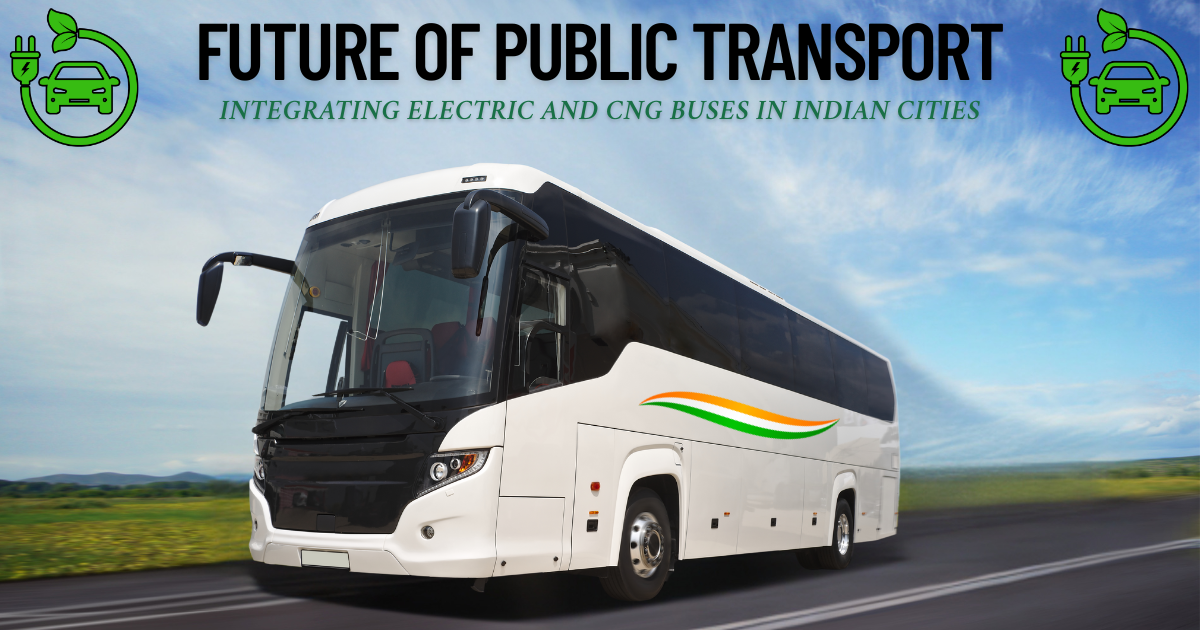Future of Public Transport: Integrating Electric and CNG Buses in Indian Cities. As the pollution is rapidly increasing in India, people are getting more cautious. The government has already announced many pprogramsand schemes for people to become aware of public transport. The use of public transport, including electric and CNG buses, is increasing in India, as it has many benefits. To know more about the topic “Future of Public Transport: Integrating Electric and CNG Buses in Indian Cities,” read the complete article.
Future of Public Transport
Millions of people are dependent on public transportation to travel to reach offices, schools, and essential services daily. The main reason for people opting for public transport rather than private transport is that public transport is cheaper and causes fewer traffic jams. The largest proportion consists of buses, with more than 1.6 million buses running on Indian roads. But in the last decade, a rise has been noticed in the purchase and use of private vehicles rather than public vehicles. This problem can only be solved by making people aware of the benefits of public transport, especially buses.

The most commonly used public transport in India is the bus. The economic impact of bus transport cannot be overstated. By offering cost-effective travel options, buses play a crucial role in the daily commute of millions of Indians. To deal with the transportation problems, electric and CNG buses were introduced. These buses are not only cost-affordable but will also protect the environment from getting polluted by diesel buses.
Integrating Electric and CNG Buses in Indian Cities
The first steps for integrating CNG and e-buses into a city typically involve developing feasibility studies, assessments, and roadmaps and testing and piloting to understand how e-buses perform locally. Gol had taken several fiscal and regulatory measures to accelerate electric vehicle manufacturing and adoption across vehicle segments with special emphasis on electric buses.
CNG buses were taken as an alternative. CNG vehicles emit less particulate matter, thus proving to be better for the environment. The existing infrastructure enables transport corporations to adopt CNG-fueled buses over electric buses. CNG buses have been running on low operational costs in cities including Delhi, Mumbai, and Pune.
Advantages of Electric and CNG Buses
There are many advantages of opting for electric and CNG buses instead of diesel buses and private vehicles. Some of them are
Reduced Operating Costs
A diesel bus runs at about ₹20 per kilometer, while an electric bus can run at ₹7-8 per kilometer. This means there are 60% savings in operating expenses, which means huge savings in the life of the vehicle.
CNG is less expensive than the diesel bus. Trial runs in regions like Tamil Nadu have demonstrated average cost savings of ₹4 to ₹4.5 per kilometer. Additionally, cleaner combustion can lead to reduced engine wear and lower maintenance needs compared to diesel.
Lower Emissions
A traditional bus produces, on average, 1.3 kg of CO₂ per km travelled. An electric bus produces none. Therefore, while there is still an environmental impact in the production of electric vehicles, they have a majorly lower carbon footprint.
The CNG buses are equipped with catalytic converters and other emission-reducing technologies to ensure compliance with stringent environmental regulations.
Improve Air Quality
A study conducted in China, where the adoption of zero-emission vehicles is moving at a fast pace, showed that the health benefits due to the increasing share of EVs outweigh the climate benefits.
CNG buses can reduce carbon monoxide emissions by up to 70%, nitrogen oxide emissions by up to 80%, and particulate matter by up to 90% compared to diesel buses. This makes CNG buses an excellent choice for cities aiming to enhance air quality and reduce their carbon footprint.
Noise Reduction
People often prefer pleasant environments over noisy ones. Electric vehicles have fewer moving parts, are automatic, and have a lower center of gravity, all characteristics that people prefer more. The rides are also comfortable and passenger-friendly.
CNG engines are up to ten decibels quieter compared to diesel engines. With CNG buses, municipalities can improve the quality for both passengers and locals while also increasing compliance.
Energy Security
Since electricity can be produced domestically from a variety of sources, electric buses can lessen India’s dependency on imported fossil fuels while also improving energy security.
Compared to diesel, CNG buses use petrol, which is becoming more widely available domestically in India and helps to lessen reliance on imported crude oil.
